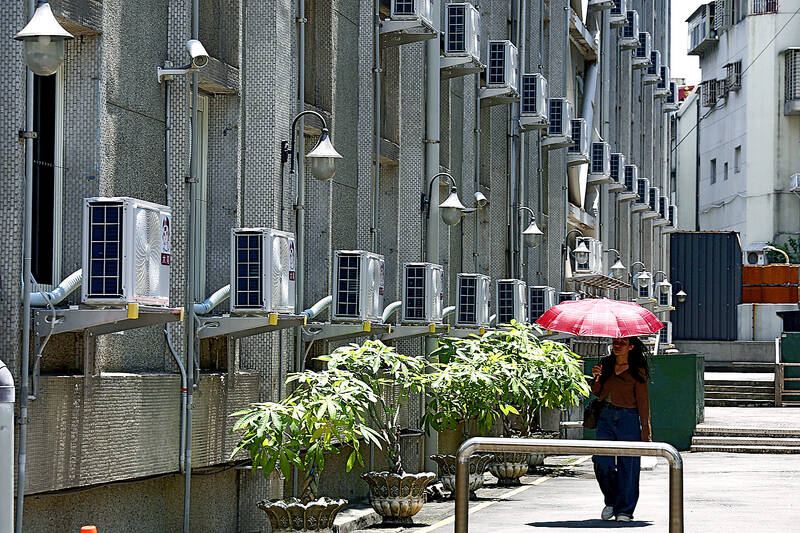The Ministry of Economic Affairs is to determine whether to raise electricity rates based on the outcome of a September meeting of its electricity rate review committee, Deputy Minister of Economic Affairs Lai Chien-hsin (賴建信) said yesterday.
A local media report yesterday speculated that a 5 percent rate hike affecting 14.5 million residential and industrial customers was being considered for October if the legislature fails to approve a NT$100 billion (US$3.43 billion) subsidy for Taiwan Power Co (Taipower, 台電).
The report cited Minister of Economic Affairs J.W. Kuo (郭智輝) as saying that the committee in September would have “no reason not to raise prices” if the Legislative Yuan does not approve the subsidy.

Photo: CNA
The Executive Yuan has submitted a special bill to the legislature that earmarks NT$100 billion for Taipower as part of a NT$410 billion package to address international challenges.
The ministry has already established a review mechanism to evaluate electricity rates, and the committee meets biannually, Lai said.
Due to instability in the Middle East, the ministry has also formed an emergency response team to estimate possible energy price scenarios, he added.
The team has held nightly meetings since the start of the Israel-Iran conflict to monitor global developments, and the stability of the energy supply and reserves, he said.

Greek tourism student Katerina quit within a month of starting work at a five-star hotel in Halkidiki, one of the country’s top destinations, because she said conditions were so dire. Beyond the bad pay, the 22-year-old said that her working and living conditions were “miserable and unacceptable.” Millions holiday in Greece every year, but its vital tourism industry is finding it harder and harder to recruit Greeks to look after them. “I was asked to work in any department of the hotel where there was a need, from service to cleaning,” said Katerina, a tourism and marketing student, who would

i Gasoline and diesel prices at fuel stations are this week to rise NT$0.1 per liter, as tensions in the Middle East pushed crude oil prices higher last week, CPC Corp, Taiwan (台灣中油) and Formosa Petrochemical Corp (台塑石化) said yesterday. International crude oil prices last week rose for the third consecutive week due to an escalating conflict between Israel and Iran, as the market is concerned that the situation in the Middle East might affect crude oil supply, CPC and Formosa said in separate statements. Front-month Brent crude oil futures — the international oil benchmark — rose 3.75 percent to settle at US$77.01

RECORD LOW: Global firms’ increased inventories, tariff disputes not yet impacting Taiwan and new graduates not yet entering the market contributed to the decrease Taiwan’s unemployment rate last month dropped to 3.3 percent, the lowest for the month in 25 years, as strong exports and resilient domestic demand boosted hiring across various sectors, the Directorate-General of Budget, Accounting and Statistics (DGBAS) said yesterday. After seasonal adjustments, the jobless rate eased to 3.34 percent, the best performance in 24 years, suggesting a stable labor market, although a mild increase is expected with the graduation season from this month through August, the statistics agency said. “Potential shocks from tariff disputes between the US and China have yet to affect Taiwan’s job market,” Census Department Deputy Director Tan Wen-ling

As they zigzagged from one machine to another in the searing African sun, the workers were covered in black soot. However, the charcoal they were making is known as “green,” and backers hope it can save impoverished Chad from rampant deforestation. Chad, a vast, landlocked country of 19 million people perched at the crossroads of north and central Africa, is steadily turning to desert. It has lost more than 90 percent of its forest cover since the 1970s, hit by climate change and overexploitation of trees for household uses such as cooking, officials say. “Green charcoal” aims to protect what